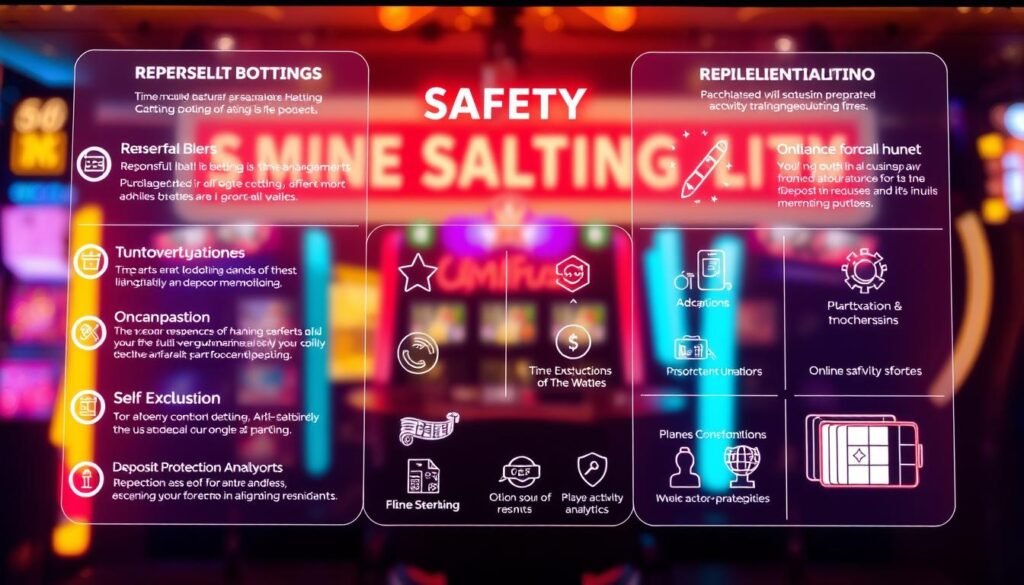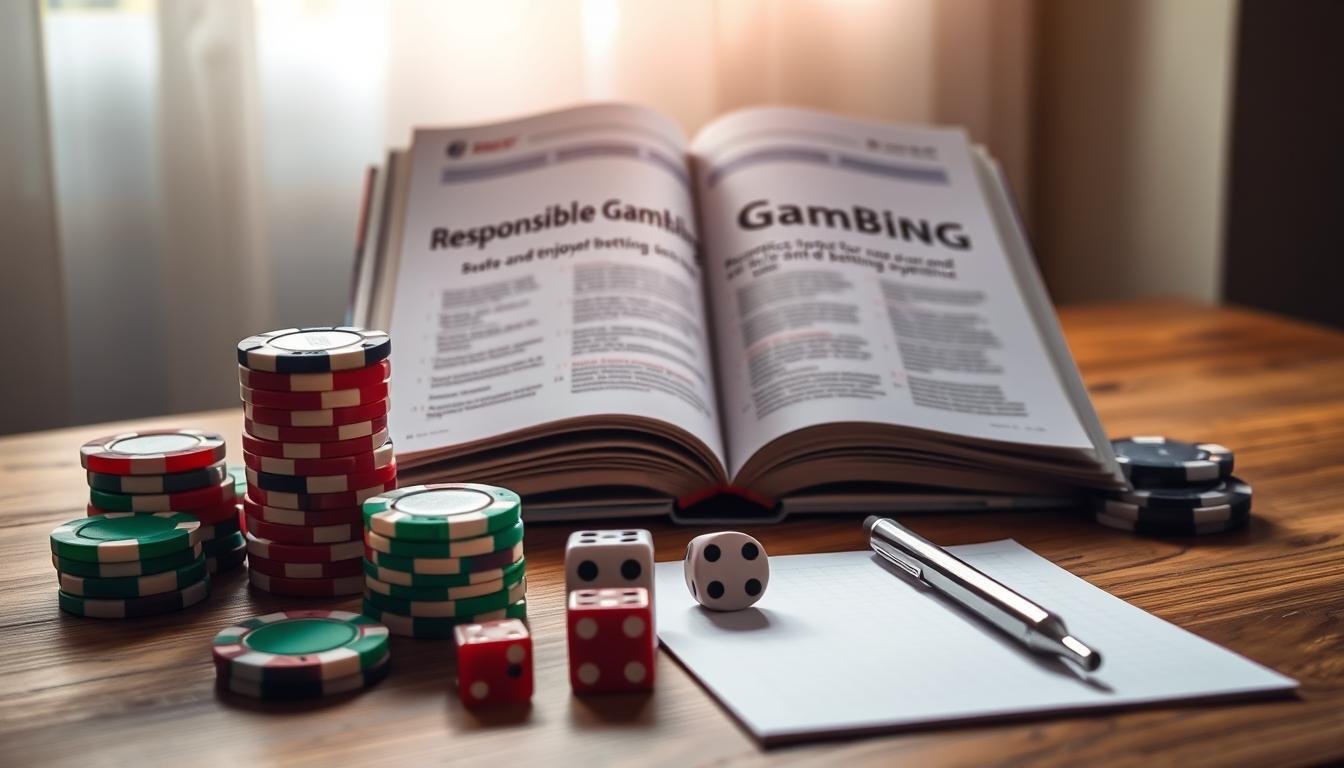Gambling is a favorite pastime for millions in the U.S. With 49% of adults playing games of chance each year, it’s key to know how to gamble responsibly. This ensures a fun and safe betting experience.
Responsible gambling is not about cutting out all fun. It’s about finding a balance in betting. Studies show 74% of U.S. adults think you can gamble responsibly. This shows the need for smart gaming habits.
Even though 90% of people gamble for fun without issues, it’s important to know the risks. Player protection means knowing your limits, managing your money, and staying emotionally balanced while betting.
This guide will show you how to bet safely. It aims to keep gambling fun, not a problem.
Key Takeaways
- Understand the fine line between entertainment and addiction
- Set clear financial and time boundaries
- Recognize warning signs of problematic gambling
- Prioritize personal well-being over winning
- Seek support when gambling feels uncontrollable
Understanding Responsible Gambling Fundamentals
Responsible betting is key to a safe and fun gaming experience. Players must navigate the gambling world with care. They need to know important rules to protect their money and feelings.
Core Principles of Safe Betting
Gambling is complex and needs smart risk management. Safe betting basics include:
- Seeing gambling as fun, not a way to make money
- Setting clear money limits
- Keeping emotions in check
- Knowing the odds of games
The Importance of Mindful Gaming
Mindful gaming is more than just rules. Emotional intelligence is vital for safe gambling. Studies show over 60% of players manage their gambling well with mindfulness.
“Gambling should be a form of entertainment, not a pathway to financial stress.” – Gambling Awareness Network
Setting Healthy Boundaries
Good gaming rules need clear limits to avoid risks. Here are some tips:
| Boundary Type | Recommended Approach |
|---|---|
| Time Limits | Set specific weekly gaming hours |
| Financial Limits | Establish maximum loss threshold |
| Emotional Check | Monitor stress and impulse levels |
Fair play means being aware and managing yourself. By following these steps, gamblers can have a safer, more fun time. They also reduce the chance of bad outcomes.
Creating a Personal Betting Plan

Creating a solid betting plan is key for safe gaming. Good gambling strategies need careful thought and personal responsibility. The right plan can make betting a fun, controlled activity.
“Successful betting begins with self-awareness and disciplined planning.” – Responsible Gaming Expert
Your betting plan should cover three main points:
- Financial Limits
- Time Management
- Tracking Performance
Experts say to set clear money limits. Sports betting budgets should not exceed 1-2% of total income. This helps avoid financial problems and keeps gaming safe.
Important parts of a good betting plan include:
- Have a set gambling budget
- Stick to strict betting time limits
- Set win/loss goals
- Check and change your strategy often
Studies show that people who check their finances before betting gamble less. A structured plan lets you enjoy betting while keeping your finances safe.
It’s vital to track your betting results. Keep records of your bets, wins, and losses. This helps you see your betting habits and make better choices.
Remember, the aim of safe gaming is to enjoy betting without losing control.
Financial Management in Online Gambling
Managing your money is key in online gambling safety. Players should never risk their financial stability. The casino guide helps keep your finances safe while you play.
Smart gamblers think about their money when playing online. About 70% of gamblers have trouble with betting costs. So, being financially smart is very important.
Budget Setting Guidelines
For safe casino play, follow these steps:
- Use only disposable income for gambling
- Set clear weekly/monthly spending limits
- Don’t use money meant for bills
- Keep your gambling money separate
“Gambling with money you can’t afford to lose is the first step toward financial disaster.” – Gambling Responsibility Expert
Tracking Gambling Expenses
It’s important to keep an eye on your spending. Use digital tools and apps to track your bets accurately.
| Expense Tracking Method | Effectiveness |
|---|---|
| Dedicated Gambling Spreadsheet | High |
| Mobile Expense Tracking Apps | Very High |
| Bank Statement Review | Medium |
Emergency Fund Protection
Keeping your emergency savings safe is crucial. Experts say to keep your gambling money separate from your savings. This helps avoid financial trouble.
By following these money management tips, you can enjoy online gambling safely. And keep your finances in good shape.
Time Management Strategies for Safe Gaming

Responsible gambling means managing your time well. It helps keep gaming in check and balances it with daily life. Players need to find ways to control their gambling and stay safe.
“Time is the most critical resource in responsible gambling. Managing it wisely prevents addiction and maintains emotional well-being.”
Protecting yourself from gambling risks starts with good time management. It’s about setting limits and keeping control over your gaming. This way, you gamble ethically and avoid harmful behavior.
- Set strict time limits for gambling sessions
- Use built-in session tracking tools
- Schedule alternative activities
- Practice regular self-assessment
Keeping track of how long you gamble is key to staying responsible. Online sites now have tools to help you monitor your time.
| Time Management Tool | Purpose | Benefit |
|---|---|---|
| Session Timers | Limit gambling duration | Prevents excessive play |
| Automated Alerts | Notify players of extended sessions | Encourages breaks |
| Activity Logs | Track gambling time | Increases self-awareness |
Proactive time management is vital for ethical gambling. By using these strategies, players can enjoy gaming while keeping their personal and emotional well-being intact.
Having a plan for your gambling time is crucial to avoid addiction. Taking breaks, trying new things, and checking in with yourself are important. They help you have a healthy relationship with gaming.
Recognizing Warning Signs of Problem Gambling

Gambling addiction can sneak into our lives, causing big problems. It’s important to know the early signs to bet responsibly and keep our minds healthy.
Spotting gambling problems needs watching for signs in behavior, feelings, and money. Here are some tips to see if gambling is becoming a bad habit.
Behavioral Red Flags
- Going to gamble more often and for longer
- Ignoring work, family, or personal life
- Finding it hard to stop gambling
- Gambling to avoid problems or bad feelings
Emotional Indicators
Feeling signs of gambling addiction can be hard to spot but very important. About 80% of compulsive gamblers face big emotional issues.
- Feeling anxious when you can’t gamble
- Getting moody because of gambling results
- Feeling guilty or ashamed after gambling
- Using gambling to deal with problems
Financial Warning Signs
| Warning Sign | Potential Impact |
|---|---|
| Borrowing money to gamble | High risk of financial trouble |
| Hiding how much you spend on gambling | Could hurt relationships |
| Increasing how much you bet | Increases addiction risk |
| Using up savings or retirement money | Could lead to long-term financial loss |
Pro tip: Only 10% of people with gambling problems get help. Spotting these signs early can stop bigger problems.
“Awareness is the first step towards responsible betting and recovery.” – National Council on Problem Gambling
If you or someone you know shows these signs, getting help is key. Betting responsibly means knowing your limits and caring for yourself more than winning.
Essential Tools for Safe Online Betting

Online gambling safety needs smart tools to help players stay in control and avoid risks. Today, safe gambling sites offer advanced features to stop harmful betting habits.
Important tools for safe casino play include:
- Deposit limit settings
- Loss limit controls
- Self-exclusion programs
- Activity tracking software
- Real-time spending alerts
Modern tech helps players manage their gambling. It lets them set financial limits and watch their betting habits closely.
| Tool | Function | User Benefit |
|---|---|---|
| Deposit Limits | Restrict maximum daily/weekly deposits | Prevents overspending |
| Time Tracking | Monitor gambling session duration | Encourages balanced gaming |
| Self-Exclusion | Temporary platform restriction | Supports addiction prevention |
Financial awareness is key to a healthy online gambling relationship. Using these tools, players can bet safely and avoid harm.
“Responsible gaming is about control, not restriction” – Gambling Wellness Institute
For more help, users can reach out to national helplines like 1-800-GAMBLER. They offer confidential advice. The aim is to make betting fun and safe, focusing on player well-being.
Self-Exclusion Programs and Their Benefits

Responsible gambling means taking steps to control how much you gamble. Self-exclusion programs help players do this. They offer a way to limit gambling activities.
These programs help those who can’t stop gambling. By staying away from gambling places, people can take back control of their lives.
How Self-Exclusion Works
Self-exclusion lets people block themselves from gambling sites. Here’s how it works:
- Voluntarily registering for exclusion
- Selecting a specific exclusion period
- Preventing access to gambling venues and online platforms
Types of Exclusion Options
There are different self-exclusion options for everyone:
| Exclusion Type | Duration | Coverage |
|---|---|---|
| Short-Term | 3-6 months | Single Casino/Platform |
| Medium-Term | 1-2 years | State-Wide Exclusion |
| Long-Term | 3-5 years | Multi-Platform Exclusion |
Implementation Process
Modern self-exclusion uses tech like facial recognition for strict rules. It’s a private way to stop gambling.
“Self-exclusion is not about punishment, but empowerment and responsible gaming.” – Gambling Wellness Institute
Only 10% of those with gambling problems get help. Self-exclusion fills this gap. It’s a practical way to manage gambling.
Building a Support Network for Responsible Gaming

Creating a strong support network is key for responsible betting. It’s not just about individual efforts. It involves family, friends, and professional help.
Good player protection starts with talking openly. Sharing your gambling habits with loved ones can prevent risks. It also helps keep you accountable.
- Share your gambling activities with trusted family members
- Establish clear boundaries and financial limits
- Seek emotional support from close relationships
“A strong support network is the foundation of responsible betting” – Responsible Gambling Council
Professional help is also vital for responsible betting. Groups like the National Council on Problem Gambling (NCPG) and Gamblers Anonymous offer great support:
- 24/7 confidential helpline (1-800-GAMBLER)
- Counseling services
- Support group meetings
- Online resources and self-assessment tools
Research shows that targeted support is crucial. For example, the RGC has special programs for different communities. They know gambling risks can change based on who you are.
Remember, asking for help is brave, not weak. A good support network helps you keep your gambling healthy. It also protects your well-being.
Understanding Odds and House Edge

Getting good at gambling means knowing odds and house edge. It’s all about the math behind betting. Knowing this helps you make better choices.
Probability is key to smart betting. Casino games are made to favor the house, but the edge varies by game.
Probability Basics
Every game has its own set of probabilities. Knowing these helps you make smart bets:
- Blackjack has a very low house edge, about 0.28%
- Roulette (Single Zero) has a 2.70% house advantage
- Slot machines have a house edge between 2%-15%
Common Gambling Misconceptions
“Luck is not a strategy, mathematics is.”
Many people believe winning is just luck. But, thinking past results predict future ones is a big mistake.
Making Informed Decisions
Good gambling is about understanding stats. Here are some important points:
- Outcomes within 1 standard deviation: 68.26% chance
- Outcomes within 2 standard deviations: 95.46% chance
- Outcomes within 3 standard deviations: 99.74% chance
Smart gamblers use math, not just luck.
Maintaining Emotional Balance While Gambling

Gambling can be a wild ride that tests even the most disciplined people. Keeping your emotions in check is key to responsible gambling. It helps avoid making rash decisions and supports safe betting practices that keep your mind and wallet safe.
Studies show that emotions play a big role in how we gamble. Winning can make us feel excited, while losing can lead to stress or frustration. Knowing how these feelings affect our choices is crucial for ethical gambling.
“Emotional intelligence is your greatest asset in responsible gambling.” – Gambling Wellness Institute
- Recognize emotional triggers before gambling
- Practice mindfulness during betting sessions
- Set clear emotional boundaries
- Take breaks when feeling overwhelmed
Experts say building mental toughness is important:
- Self-reflection after each gambling session
- Practicing positive self-talk
- Accepting losses as learning opportunities
- Maintaining realistic expectations
Professional counselors believe that mindfulness can greatly help manage emotions while gambling. Techniques like meditation and deep breathing can keep you calm and stop you from making impulsive bets.
| Emotional State | Recommended Action |
|---|---|
| Excitement after winning | Take a break, avoid escalating bets |
| Frustration after losing | Practice self-compassion, analyze strategy |
| Stress or anxiety | Stop gambling, seek support |
Remember, responsible gambling is about keeping your emotions balanced. It’s about seeing betting as fun, not a way to solve life’s problems.
Legal Aspects of Safe Betting

Understanding online gambling laws is key to safe betting. As of 2021, responsible gaming practices are more important than ever for player safety.
Key legal points for safe gaming include:
- Age restrictions (21 years in most states)
- Platform licensing and regulation
- Geolocation compliance
- Identity verification protocols
Online gambling laws are changing. Now, 35 states and Washington D.C. allow legal sports betting. Responsible gaming is a big focus for both regulators and operators.
| Legal Aspect | Player Protection Measure |
|---|---|
| Age Verification | Prevent underage gambling |
| KYC Protocols | Ensure player identity authentication |
| Geolocation Tracking | Maintain jurisdictional compliance |
“Understanding legal regulations is fundamental to maintaining a safe and enjoyable gambling experience.”
Players should bet on licensed sites with strong online gambling safety measures. Legal markets offer better player protection, clear operations, and legal help if needed.
By knowing the laws and choosing trusted sites, gamblers can bet safely. This ensures a fair and responsible gaming experience.
Conclusion
Responsible gambling is key to a safe and fun betting experience. Studies show that player protection programs can greatly lower gambling risks. Even though only 29 studies have looked into this, we’re learning more about safe betting.
Self-exclusion programs are showing great results, helping about 50% of at-risk gamblers. Learning about money and setting limits are important for player safety. People who stick to their gambling budgets gamble less.
Knowing the psychological side of gambling helps keep things in check. By spotting warning signs, setting limits, and getting help when needed, gamblers can make their experience better. The aim of responsible gambling is to keep it fun and controlled.
Safe betting needs dedication, self-awareness, and a proactive stance on risks. Whether you gamble often or just sometimes, responsible gambling helps keep it healthy. Stay informed, stay in control, and always put your well-being first.


